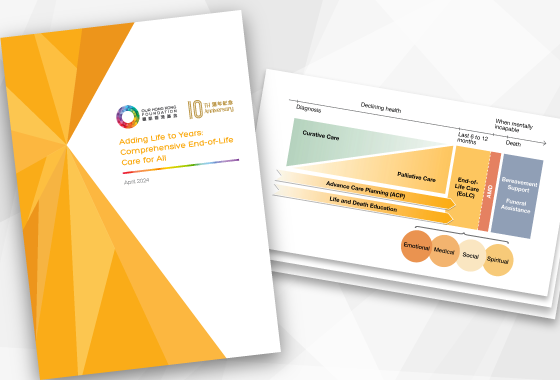Rethinking primary care for mental health in combating coronavirus: from illusion to inclusion
This article appeared originally in the TheStandard on 17 Mar 2020.
Authors: Tiffany Hon, Researcher at Our Hong Kong Foundation
As the novel coronavirus (COVID-19) continues to spread across national boundaries and the number of confirmed cases climbs, the mental health impact of the disease tightens its grip on Hong Kong and the world. A sense of uncertainty surrounding COVID-19, its parallels with severe acute respiratory syndrome (SARS), and the strained supply of preventive equipment, coupled with themes common to outbreaks of life-threatening diseases, have sparked and perpetuated fear, anxiety and distress.
Mental health professionals across the world have raised concerns about the mental toll of COVID-19, especially on medical professionals as well as infected individuals and their family members. Attention has been called to adequately integrate mental health considerations into public health emergency plans, by leveraging on primary care and community resources.

Combating Coronavirus requires not only a physical health response
The Lancet, an internationally renowned medical journal, published three articles in the first week of February stressing the significance of mental health consequences of COVID-19, and calling for timely measures to be developed and implemented. The journal articles highlighted that based on past experiences in dealing with global epidemics, the resulting mental health problems and disorders arising from infectious disease outbreaks were common occurrences.
According to the cited research, as much as 55% of SARS survivors experienced diagnosable post-trauma stress disorder, and 39% depression. Meanwhile, medical professionals who worked in the high-risk units (such as SARS wards, A&E wards and pulmonary medicine departments), were twice as likely to report post-trauma symptoms compared to those without these exposures.
Despite the significance of mental health consequences of past global epidemics, the current mental health needs of COVID-19 have been under-addressed, with limited available epidemiological data on the mental health problems and psychiatric morbidity, and inadequate mental health training for most health professionals working in isolation units and hospitals.
Primary care for mental health: a necessary part of a comprehensive response plan
While general public health interventions, including infection prevention and control, are essential in the combat of an infectious disease outbreak, the World Health Organization (WHO) has warned that all too often, mental health is neglected or inadequately recognized. WHO recommends that government and community representatives should collaboratively formulate plans and allocate resources to support mental health needs throughout phases of preparation, acute response and subsequent recovery. Meanwhile, mental health services that are community-based and integrated with primary care services are essential to a mental health response that generates effective outcomes and minimizes stigma and discrimination.
In view of the virulence of COVID-19 and in the interest of the people’s mental health, the National Health Commission of China published guidelines that clearly specify the incorporation of mental health into the overall response plan to combat COVID-19. Health service personnel ranging from non-specialized workers in the community to hospital psychiatrists were mobilized and tasked to provide primary to specialized mental health care, appropriate to the needs of different target groups, including i) patients with confirmed and suspected infections, medical care and related personnel, ii) those who had close contacts with patients, iii) susceptible groups (e.g., older people, children, and pregnant women), and iv) the general public. Primary care for mental health forms a necessary part of a comprehensive response plan to an outbreak of life-threatening disease.
Scaling-up primary care for mental health in Hong Kong
In Hong Kong, although the Government has yet to disseminate a set of coordinated guidelines that incorporates mental health into the overall response plan to combat COVID-19, a host of non-government organizations and community representatives have independently provided tips and advice on how to maintain mental health in the face of COVID-19.
Dr Chu Wai-sing, former Chief of Service and Cluster Service Coordinator (Family Medicine and Primary Healthcare) Hong Kong East Cluster, Hong Kong Hospital Authority, also stressed the role of primary care doctors and family doctors in providing community-based education, early identification of mental disorders, and treatment of common mental health disorders associated with COVID-19, which helps alleviate the pressure on public hospitals during this difficult period. Nevertheless, Dr Chu noted a lack of coordination in the provision of mental health services, during the acute response to an infectious disease outbreak as well as long-term primary care development.
In recent years, the Hong Kong Government has echoed WHO’s definition on health – ‘no health without mental health’ and concurrently set strengthening primary healthcare services as a key priority. Ironically, the blueprint for the development of primary healthcare services largely overlooked mental health, while the Mental Health Review Report scarcely discussed the role of primary healthcare as part of strengthening mental health care in Hong Kong.
Hopefully, as COVID-19 tightens its grip on Hong Kong, memories of ‘no health without mental health’ are reconsolidated not merely in the form of a slogan, but also the foundation of a strategic public health response plan as well as the development of comprehensive primary healthcare services.



